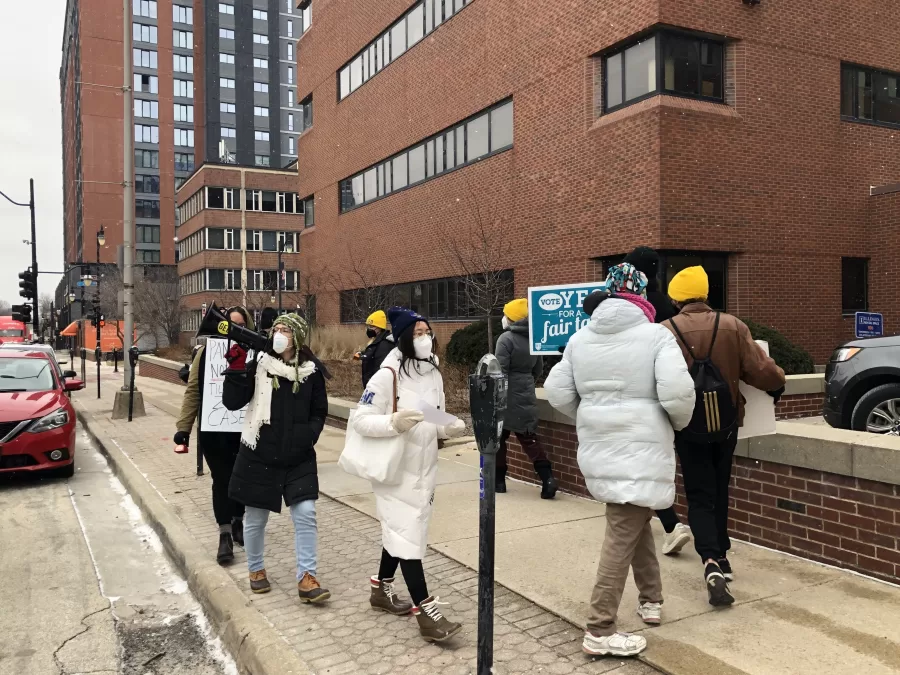UI, GEO end semester with no agreement
GEO protesters on Feb. 26 voice opinions over mask policy. GEO’s and University’s contract negotiations reach an inclusive agreement towards the end of the year.
December 22, 2022
Since its contract with the University expired, the Graduate Employees Organization has been in negotiations with the University for a new contract. However, the parties have yet to reach an agreement.
According to Karla Sanabria Véaz, GEO co-president and graduate student, over 3,000 graduate employees continue to work under an expired contract, and over 100 of them experienced deductions in payment. Meanwhile, the University officials say that they provided the GEO with a proposal.
“We presented the GEO with a comprehensive proposal on March 7, 2022, and after 17 bargaining sessions, the GEO has yet to respond to each of the proposals within that document,” said Robin Kaler, associate chancellor for Public Affairs at the University, in an email.
Throughout the bargaining process, GEO members protested, considering the negotiations unsuccessful. In response to the deductions in payment, the GEO protested during the Chancellor’s speech on Oct. 28, chanting “What’s the state of U of I? Stealing checks from you and I.”
“Graduate workers have been working under an expired contract, which means that we are working under the same salary, working conditions and protections as 5 years ago,” Sanabria Véaz said. “On top of that, this August, the University arbitrarily decided to take away an approximately 3% increase that several (teacher’s assistants) and (graduate assistants) signed in the summer.”
Get The Daily Illini in your inbox!
This August, the contract between the GEO and the University expired. According to Sanabria Véaz, the contract itself was made 5 years ago based on the socio-economic situation that was relevant in 2017.
“The world has changed substantially from 2017 to now: We have new administrators, we are coming from a pandemic, inflation is extremely high, and the University is pushing us into a very terrible position,” Sanabria Véaz said. “They are not leaving us any other option but to use our right as workers to protest legitimately.”
Even though the contract expired in August, the unsuccessful contract negotiations have been going on for the last 8 months.
“We have been bargaining for eight months — six of those months they refused to provide a full proposal, so we haven’t met any agreements on anything,” said Cassidy Farrar, a teaching assistant in communications and member of the communications committee at GEO.
In a summary released on Dec. 16, a day after the last bargaining session of the semester took place, the GEO said it “sees mediation as an important step to expedite the bargaining process.”
“Towards the end of the session, the GEO asked if the admin would be willing to pursue joint mediation in the hopes of reaching agreement on a fair contract sooner,” the statement said. “But the admin refused, stating that they, ‘Do not believe it is necessary at this time.’”
The GEO’s demands include free year-round health care, wages adjusted to the current economic situation, return of the promised 3% increase in payment and additional support for graduate employees with children.
The graduate employees’ tense contract negotiations are reflected all around the country. Recently, contract negotiations between academic workers and the University of California led to a five-week strike — one of the largest in academia in the U.S.
“These kinds of contract negotiations have occurred over the past 15 or more years, both on this campus and other schools that have unions for research and teaching assistants,” said Michael Leroy, a professor in the School of Labor and Employment Relations. “What seems to be new is the element of University engaging in what it’s called hard bargaining.”
According to Leroy, the case with the University appears to be an example of hard bargaining where it is not necessarily unlawful but it’s turning up the pressure on employees to come to terms.
“I have seen this repeatedly with unions in industrial workplaces,” Leroy said. “What makes this different is here we are talking about not only employees but students and people who have a vital teaching and research function.”
If the University continues to remain silent, it may lead to a conflict escalation, according to Leroy.
“It is an inflammatory bargaining tactic, we have seen over the past few months student unions here and elsewhere engage in increasingly noisy protests,” Leroy said.
GEO members, in turn, openly claim that they are not planning to stop bargaining till they achieve their goals.
“The University can do a life-changing contribution to the lives of the people that make sure this University runs,” Sanabria Véaz said. “We want to let the University know very very clearly that they are pushing us into this situation, and if they keep pushing us, we will keep escalating with all the resources that we have and we need.”







